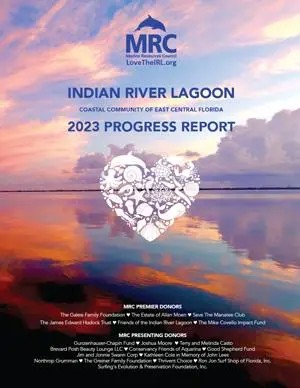IRLNews:Marine Resources Council Releases IRL Progress Report
“The east central Florida regional economy depends upon a healthy lagoon,” said Jim Moir, interim executive director of MRC. “The report explains in simple terms that much is already being done to return balance to the region, what more will need to happen, and what everyone must do to help,”
Waterways, canals and stormwater, from across the region east of Orlando, flow to the 150-mile-long lagoon, which also is an estuary. When healthy, it supports one of the most diverse habitats in North America. The lagoon is one of only 28 Estuaries of National Significance in the U.S., making it a growing focus of research and resources. It takes in almost 40 percent of the state’s east coast.
The report explains that recently water in the Indian River Lagoon is generally clearer, and nitrogen and phosphorus pollution is being reduced, helping to curb toxic algal blooms. “We’re making historic progress,” said Moir. “Yet, seagrass, the foundation of the lagoon ecosystem, is not recovering. We need to know why.” The phenomenon is addressed in the report.
The report explains how the U.S., State of Florida, local governments, non-profit organizations, corporations, and others are uniting to provide clear, concise, and consistent communication about the lagoon. “We need to share the progress and interesting stories with the public,” said Moir.
MRC explains in the report that it is calling on the State of Florida to broaden water quality testing in the Indian River Lagoon, and on each county and municipality in east central Florida to convert to Low Impact Development (LID) practices. “We need to know what is in our water and how it is getting there, and we need to slow the flow of water into the lagoon while we do it,” said Moir. Water quality testing conducted by the state currently only looks at five factors, explained in the report; however, hundreds of pollutants may be disallowing seagrass to recover.
Slowing the flow includes major wastewater and stormwater infrastructure upgrades, and septic to sewer conversions. It also can be as simple as installing rain barrels to catch rainfall from the roof of a structure, and channeling it into native rain gardens on site, along with other common sense practices explained in the report.
Help MRC stir a SEA Change: Science + Education + Action. Discover how at LoveTheIRL.org, or call 321-725-7775.

